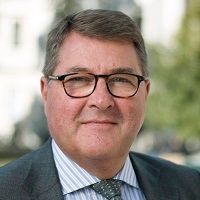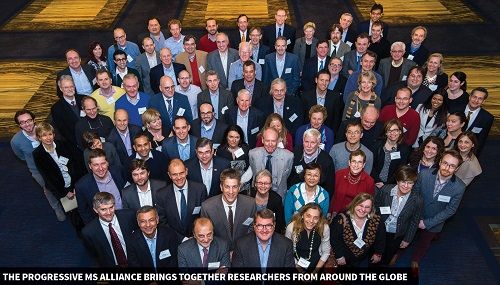How Alan Thompson, MD, Changed the World of Multiple Sclerosis Treatment
Curiouser and curiouser. Like Alice in Wonderland, when Alan Thompson, MD, first entered multiple sclerosis research, he was deeply puzzled. But he kept going deeper.

Professor Alan Thompson, MD, the University College London Faculty of Brain Sciences, Institute of Neurology, Department of Brain Repair and Rehabilitation, is a highly respected neuroscientist. A lover of music, art, and good wine, he splits his time between work in London and enjoying the sun and sea in Barcelona, Spain.
But there was a time he felt like Alice entering Wonderland. That was the day when, as a student at Trinity College, Dublin, Thompson opened a door to a basement lab.
The facility turned out to be the college’s multiple sclerosis lab. Curiously, he recalled, it was empty — even though MS is more common in Ireland, where Thompson grew up, than in many other places. He might have been Alice, encountering the Cheshire Cat.
“In my naiveté, I thought why can’t they sort this out? It must be possible,” Thompson recalled.
Opening that door led him to a career in a field that has since seen amazing advances. At the time Thompson was in college, there were no treatments available for MS patients.
It was the beginning of his journey.
After getting his BS at Trinity College in 1979, Thompson went on to complete post-doctorate research at the Institute of Neurology, University College London and National Hospital for Neurology and Neurosurgery, Queen Square.
At that time, his mentor, Ian McDonald, suggested he specialize in progressive MS. Of McDonald, Thompson says, “He was both brilliant and extremely generous — a rather rare combination.” MacDonald developed the McDonald Criteria, was the first to use magnetic resonance imaging (MRI) technology to track disease progression in MS, and was also the first to provide evidence of demyelination. McDonald passed away to the great loss of the MS community, in 2006.
Thus began a career that has spanned 30 years.
Thompson says that the last five have been the most exciting. Now, at the age 61, he is seeing breakthroughs that couldn’t have been imagined when he was graduating from Trinity.
One of his proudest achievements is helping found the International Progressive Multiple Sclerosis Alliance, a global research and advocacy group founded in 2012. With offices in the UK, the Alliance is comprised of MS societies from 15 nations. These managing members are committed to providing the Alliance funds of at least 765,000 Euros over the next three years.

The Alliance was created through the efforts, collaboration, and cooperation of many organizations and individuals.
Although Thompson humbly gives much of the credit for the Alliance to others, particularly patients who have progressive MS, his colleagues and coworkers are quick to assert that he has been a key player in bringing people together so that the Alliance can exist.
His research has also contributed to the remarkable growth in treatment options for people with MS. More specifically, Thompson has helped to develop outcome measures which include the patient’s perspective, investigated the pathology of the disease using imaging technology, and performed trials of various interventions.
In the early 80s, when a person was diagnosed with MS, that was the only contribution medicine had to make. There were no treatment options. Then, in the late 1980s and early 1990s, treatments began to emerge for the relapsing-remitting form of the disease (RRMS), and now patients with RRMS and their doctors have choices when forming a treatment plan.
But there is much to be done. For the two-thirds of MS patients with progressive MS, the choices remain non-existent. There are more than one million people with progressive MS.
Helping this large group of patients has been the driving force behind Thompson’s work.
“My stimulus for focusing on research was simply the frustration of reviewing patients every couple of months, noting their decline, and being able to do little, if anything, to influence their deterioration,” he says.
Thompson says that the creation of the Alliance began with those patients. “This large number of people with significant disabilities and problems because of their MS essentially felt they were being ignored,” he said during an interview.
Most often, patients first have RRMS, which can become the progressive form of the disease, although some patients have primary progressive MS, meaning they have no treatment options from the outset.
Thompson says that the move to create the Alliance began with the MS societies, which reached out to people working in the world of academics to gauge the level of interest in working together and focus on the area of progressive MS. He says that there was more than an interest; there was a consensus that finding treatments for progressive MS was “the major unmet need in MS.”
The Alliance’s main goal is to speed up the development of new treatments for progressive MS. They list four specific goals: A better understanding of progression; shorter, faster clinical trials; more clinical trials of prospective treatment agents; and novel therapies to manage symptoms.
Since there are groups and individuals all over the world, including Thompson, who have been pursuing the same goal of a treatment for progressive MS, it seems logical that they would work together.
Tim Coetzee, PhD, Chief Advocacy Services, and Research officer at the National Multiple Sclerosis Society, says, “It seems intuitively obvious, but getting it done is really difficult.”
Thompson, as it turns out, is particularly good at guiding collaboration. Coetzee, who has worked with Thompson closely over the last 5 years, says, “He is great at bringing scientists, clinicians, and funding partners together and the other piece is that he has a remarkable ability to connect the scientific and the medical perspective.”
In 2016 at the European Committee for Treatment and Research in Multiple Sclerosis (ECTRIMS) the Alliance announced the winners of the Collaborative Network Awards. These are multi-year grants, which Thompson said are designed “to do something truly transformative,” adding that each winner had to be very clear about what they would deliver in the next 5 years.
When the Alliance first put out a call for research proposals, the response was overwhelming, Thompson said.
Groups from around the world “agreed to have a single review process, run by a single group, that is the Scientific Steering Committee, which I chair -- and that is just unprecedented in the MS world.”
Thompson thinks that the willingness to collaborate and cooperate shows how important finding a treatment is, and how focused on that goal the research community has become. Another critically important piece of the puzzle was having a transparent process to reach decisions.
Although Thompson is heavily involved in the goals related to finding and testing agents suitable for treatments, he says that one, single factor that has impeded the advancement of treatment is the relatively poor understanding of the mechanisms that underpin progression.
“The concept of progression, which I would define of gradual worsening in the absence of relapses, can often be quite subtle and difficult to identify. It’s often diagnosed in retrospect,” says Thompson. Gaining an understanding of exactly what is happening to the brain tissue during progression will help researchers target and develop treatments.
Interestingly, there is not an official medical definition for progressive MS. Rather, there is, according to Thompson, something closer to a clinical description. Thompson thinks that it is more important to focus on eradicating all evidence of disease activity, than on developing a definition, saying, “Rather than focusing too much on labels which people can spend hours and weeks and months debating, what we should really be focusing on is what’s happening to the patient.”
There are still many unanswered questions about progressive MS. For example, the differences between primary progressive MS and secondary progressive MS are still not entirely clear, though, Thompson says there is now consensus that the differences are more relative than absolute. Even progression itself is not understood.
Even with the unanswered questions, the research is advancing more rapidly than at any point in the past, thanks in part to the Alliance, as well as the increasing focus on progressive MS, and of course, to individuals like Thompson, who have dedicated so much to caring for patients and pursuing research.
People who work with Thompson are happy to share their positive experiences of working with him. Professor Olga Ciccarelli, PhD, and a colleague at UCL says of working with Thompson, “He is very supportive, practical and objective,” and says she enjoys his “excellent sense of humor.”
Another colleague, Professor Xavier Montalban, MD, PhD, of the Department of Neurology and Neuroimmunology at Vall d’Hebron University Hospital, offers an illustration of Thompson’s humor, relating a story about a time when Thompson was showing some old slides at a meeting. He was discussing active lymphocytes and, Montalban says, “the slides started to jump in the carrousel in a very abrupt way.” Without missing a beat Thompson said, “You see how active the lymphocytes are in MS!”
Coetzee says “I’ve found him to be strategic and focused and outcomes-oriented,” whether he is working on organizing a conference or seeking funding for research.
Thompson is, characteristically, enthusiastic about the future, saying, “One of the things that has happened in just the last 12 months is that we have had two positive phase III trials, so there are two treatments emerging for progressive MS.”
Though both have only modest efficacy, “It’s a start and from every point of view is very important,” he says.
After decades of having so little to offer patients, “being able to say we have some treatments available changes the mindset.”